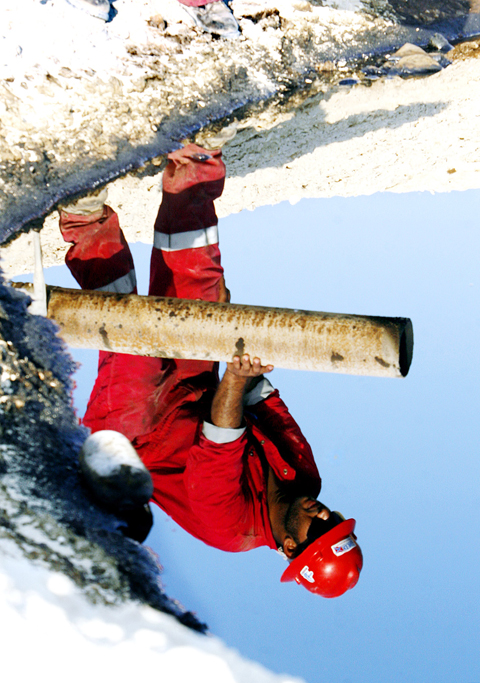Oil prices fell to a three-year low below US$49 a barrel yesterday in Asia as plunging stock markets, driven down by more bad US economic news, battered investor confidence.
Light, sweet crude for January delivery was down US$0.95 to US$48.47 a barrel in electronic trading on the New York Mercantile Exchange by midday in Singapore.
The December contract, which expired on Thursday, fell overnight by US$4.00 to settle at US$49.62 after sliding to US$48.50, the lowest level since May 18, 2005.

PHOTO: AP
“Sentiment is totally bearish, parallel to the stock market,” said Gerard Rigby, an energy analyst at Fuel First Consulting in Sydney. “Everyone is just doom and gloom and not seeing any light on the horizon for the next 12 months.”
Traders are worried that a global recession will undermine energy demand. Already, oil prices have tumbled by two-thirds from their peak of nearly US$150 a barrel in mid-July.
The Dow Jones industrial average fell 5.6 percent on Thursday to its lowest level since March 2003 after the Labor Department said new applications for jobless benefits exceeded analyst estimates and rose to the highest level of claims since July 1992.
The S&P 500 index fell 6.7 percent on Thursday to an 11-year low.
The S&P 500 has dropped more than 52 percent below its record from last October, making this the second-biggest bear market on record, exceeded only by the 83 percent drop between 1930 and 1932.
Asian stock markets followed their US counterparts down yesterday, but they pared losses as trading progressed. Japan’s benchmark Nikkei index was down 1.2 percent, Hong Kong’s Hang Seng index was down 1.4 percent. South Korea’s key index was up 0.4 percent.
“US$50 [per barrel of oil] was a psychological support level,” Rigby said. “Since we haven’t traded this low for so long, it’s hard to find a new support level.”
OPEC, which accounts for about 40 percent of global supply, may cut production before its next official meeting on Dec. 17, Rigby said. OPEC president Chakib Khelil has signalled the group may announce output reductions at the meeting, but some members, such as Iran, have called for earlier cuts.
OPEC lowered production quotas by 1.5 million barrels a day last month.
“Their revenues are dropping so much, I think OPEC will have to call an extraordinary meeting and cut quotas to try to support the market,” Rigby said. “Their last cut had zero impact on the market.”
In other NYMEX trading, gasoline futures fell US$0.01 to US$0.997 a gallon. Heating oil gained US$0.0214 to US$1.65 a gallon while natural gas for delivery next month slid US$0.038 to US$6.28 per 1,000 cubic feet (28.3m3).

MORE VISITORS: The Tourism Administration said that it is seeing positive prospects in its efforts to expand the tourism market in North America and Europe Taiwan has been ranked as the cheapest place in the world to travel to this year, based on a list recommended by NerdWallet. The San Francisco-based personal finance company said that Taiwan topped the list of 16 nations it chose for budget travelers because US tourists do not need visas and travelers can easily have a good meal for less than US$10. A bus ride in Taipei costs just under US$0.50, while subway rides start at US$0.60, the firm said, adding that public transportation in Taiwan is easy to navigate. The firm also called Taiwan a “food lover’s paradise,” citing inexpensive breakfast stalls

TRADE: A mandatory declaration of origin for manufactured goods bound for the US is to take effect on May 7 to block China from exploiting Taiwan’s trade channels All products manufactured in Taiwan and exported to the US must include a signed declaration of origin starting on May 7, the Bureau of Foreign Trade announced yesterday. US President Donald Trump on April 2 imposed a 32 percent tariff on imports from Taiwan, but one week later announced a 90-day pause on its implementation. However, a universal 10 percent tariff was immediately applied to most imports from around the world. On April 12, the Trump administration further exempted computers, smartphones and semiconductors from the new tariffs. In response, President William Lai’s (賴清德) administration has introduced a series of countermeasures to support affected

CROSS-STRAIT: The vast majority of Taiwanese support maintaining the ‘status quo,’ while concern is rising about Beijing’s influence operations More than eight out of 10 Taiwanese reject Beijing’s “one country, two systems” framework for cross-strait relations, according to a survey released by the Mainland Affairs Council (MAC) on Thursday. The MAC’s latest quarterly survey found that 84.4 percent of respondents opposed Beijing’s “one country, two systems” formula for handling cross-strait relations — a figure consistent with past polling. Over the past three years, opposition to the framework has remained high, ranging from a low of 83.6 percent in April 2023 to a peak of 89.6 percent in April last year. In the most recent poll, 82.5 percent also rejected China’s

PLUGGING HOLES: The amendments would bring the legislation in line with systems found in other countries such as Japan and the US, Legislator Chen Kuan-ting said Democratic Progressive Party (DPP) Legislator Chen Kuan-ting (陳冠廷) has proposed amending national security legislation amid a spate of espionage cases. Potential gaps in security vetting procedures for personnel with access to sensitive information prompted him to propose the amendments, which would introduce changes to Article 14 of the Classified National Security Information Protection Act (國家機密保護法), Chen said yesterday. The proposal, which aims to enhance interagency vetting procedures and reduce the risk of classified information leaks, would establish a comprehensive security clearance system in Taiwan, he said. The amendment would require character and loyalty checks for civil servants and intelligence personnel prior to